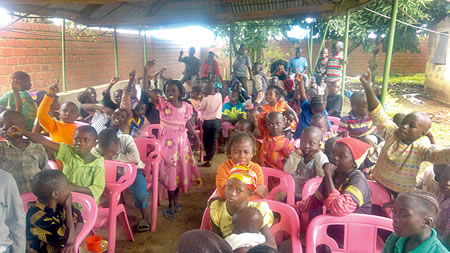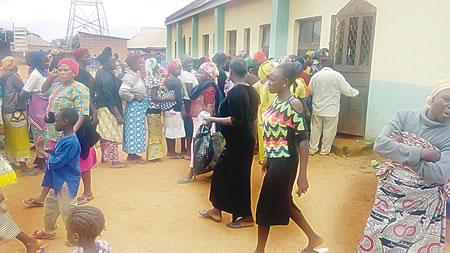
The recent report of the Committee on Resettlement of Internally Displaced Persons, in Plateau State, indicates that over 1,800 lives have been lost in recent clashes, with over 50,000 homeless, creating a humanitarian crisis. ISAAC SHOBAYO reports the economic downturn that this situation has foisted on the state.
The protracted crises in Plateau State in recent time especially in the northern part of the state, Barakin-Ladi, Riyom, Bassa, Jos South and in Bokkos local government areas have ended so many lives, rendering many homeless while communities have been sacked by gunmen suspected to be herdsmen. According to the recent report submitted by the Committee on Resettlement of Internally Displaced Persons (IDPs) set up by the state government, 1,801 people were killed in these troubled council areas in the recent attacks and 50, 212 displaced.
ALSO READ: Buhari, Saraki, Tinubu, Sultan, Alaafin, others storm Ibadan Sunday
A cross section of some of the IDPs who spoke with the Nigerian Tribune said they would have loved to go back to their various communities but their villages have been forcefully occupied by the herdsmen and their farms destroyed.
Apparently disturbed by the plight of the IDPs, the state government set up a committee on resettlement of the affected residents. The committee is expected to work out modalities on how to resettle the IDPs in their various communities.
Submitting the report last week, the chairman of the committee, Air vice Marshall (AVM) Bala Danbaba (rtd), said the committee identified 115 communities cutting across Jos North, Jos South, Bassa, Riyom, Barkin Ladi and Bokkos local government areas that were affected by the crises.

Danbaba said the committee, whose one month period was later increased to two months, received 55 memoranda and visited 27 camps where the IDPs were quartered adding that the only camp not visited was at Lere in the Dorowa area of Barkin Ladi due to security reasons.
While receiving the report, Governor Simon Lalong said as part of the strategic initiatives of the government in engendering peace and security in the state, his administration attracted the establishment of the 205 Combat and Rescue Units in Kerang. “We also attracted a mobile police squadron in Shendam, as well as the recent approval to establish mobile police barracks in Gashish District of Barkin Ladi,” he stated.
From all indications one of the reasons the people are sceptical of returning to their communities and villages is insecurity and the fear of further attack by the rampaging herdsmen who already occupy their homes and farms.
It will be recalled that the governor on Tuesday while inspecting the site donated by a private electricity company, NESCO, for the establishment of new mobile police unit in the Gashish district of Riyom local government read riot act to the land grabbers saying those who forcefully annexed homes in the Gashishi community are living on borrowed time.
However, in spite of the government initiative to resettle the displaced persons and to ensure that they live a normal life again, the unfortunate incident has subjected many of the affected residents to severe hardship.
Nigerian Tribune gathered that over 20,000 pupils of both primary and secondary schools are presently out of schools with a bleak future. A source in the research department of the state’s Ministry of Education stated that the ugly development has caused a set back to the drive by the state government to give quality education and to uplift the standard of education in the state.
According to the source, over one hundred classrooms were either burnt down or destroyed by the marauders adding that there was the likelihood that if the people were resettled as being planned by the government, there might not be classrooms to teach the students while teachers who had deserted the communities might not be willing to return to their duty posts. “The efforts of the government towards revamping the education sector in the state is being threatened, don’t forget that this unfortunate development cuts across five local governments. Based on our findings, majority of those in secondary schools have since embraced other sources of income and forced into illegal mining” he said.
Piqued by the pathetic situation, it was learnt that governor Lalong recently released funds for secondary school students in areas where external examinations could not be written.
Findings further reveal that in some communities, social amenities such as health care centers among others have been destroyed. A health worker, Tabitha Dung, said this among others is the problem the state government will have to grapple with immediately the people are resettled.
Also as a result of the protracted crises couple with large number of displaced persons farming activities in the state are presently at the ebb, most of the agile farmers in the affected communities are idling away in the city and in various camps. Plateau State is famous for its large farming of Irish potato but checks indicate that farming of this crop has dropped drastically as a result of the crises. Most of the affected council areas under siege of these attacks include Bokko, Barakin-Ladi, Riyom and Bassa.
A farmer who identified himself as Badung Micheal disclosed that in June, large hectares of Irish potato farms were destroyed by herdsmen in Bokkos Local Government Area, adding that constant attacks on farmers on their farms also forced many to desert their farms.
He further narrated that many farmers have been displaced from their villages and communities and presently in various camps. Micheal enjoined the government to address the issue by ensuring that the people return to their settlements with adequate security before the next rainy season.
It will be recalled that the Federal Executive Council (FEC) early this year approved N3.38 billion Africa Development Bank (AfDB) loan for cultivation of potato in Plateau State, while the state government was expected to contribute N595 million counterparts funding. It was learnt that with the loan, about 60,000 jobs would be created from the value chain. Unfortunately, this economic booster has been frustrated.
The rationale is that Plateau actually accounts for 95 per cent of Nigeria’s potato production. From Plateau, potatoes are exported to Ghana, Niger, Chad and other countries. Nigerian Tribune learnt that persistent crises in these local government areas have started taking their toll on this laudable project and delaying its implementation. The areas earmarked for the project are threatened by attacks and most farms have taken over by the killers with the affected farmers in disarray. The chunk of farmers, who could have driven the initiative, are either in camps or have abandoned farming for other endeavours to eke out a living.
From all indications, the crisis is affecting the state especially in the areas of education, economy and social infrastructure.





